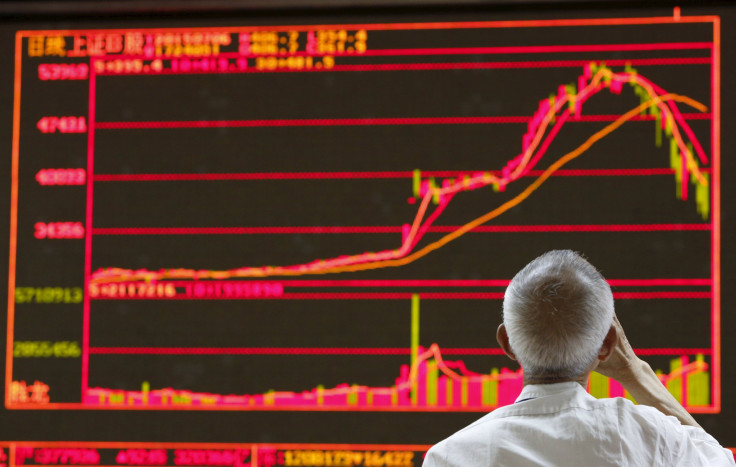Hong Kong Stocks Plunge On Greek No, Chinese Shares Close Mixed On 'Extraordinary' Government Measures

SHANGHAI -- Hong Kong shares saw their biggest one-day fall in over three years, as concerns about the eurozone's future after the Greek referendum brought the Hang Seng index down almost 800 points. Meanwhile, stocks in mainland China were mixed following government attempts to calm a near panic after weeks of falling domestic markets.
Overall, the Hang Seng fell just over 3 percent to its lowest level in four months, prompting the Hong Kong Monetary Authority to respond to what it said was the possibility of “increased volatility” on the markets by issuing a statement stressing that it was prepared to supply greater “liquidity support to the banking system” if necessary. And it also urged investors to “remain calm and manage their risks prudently.”
That’s a message many in China might wish they had heeded over recent months.
After booming over the past year to reach a seven-year high in early June, amid a wave of officially-encouraged euphoria about a new long-term market boom, Chinese shares plunged almost 30 percent in three weeks, wiping close to $3 trillion off the value of the nation’s stock markets by the end of last week.
Over the weekend the Chinese government announced what some described as an “extraordinary” series of measures aimed at boosting the stock market, which it has said is a key plank of its economic policy. The authorities announced a halt to new listings for the near future, along with significant liquidity support to a government-backed agency that offers “margin finance,” allowing investors to borrow funds to reinvest in the market.
Officials also announced that 21 of China’s biggest stock-broking houses had pledged to buy shares worth almost $20 billion dollars -- (15 percent of their total assets) -- and had also made a promise not to sell off their holdings if Shanghai’s main index stayed below 4,500 (some eight hundred points higher than its close the previous week). One of China’s biggest real estate developers, Vanke, also announced that it would buy back up to 10 billion yuan (around $1.6 billion) of its own shares to shore up the company’s market value.
For some Chinese investors these drastic moves clearly sent the signal they had been waiting for -- that the government would step in to prevent the market falling much lower: the main Shanghai Composite index soared some 8 percent in morning trading, but soon slumped back before a wave of purchases of blue chip shares -- presumably encouraged by the government -- helped it end the day 2.4 percent higher. However, China’s other major market, in Shenzhen, fell about 1.4 percent, while its high-tech board, the ChiNext continued its recent slump, after supercharged gains earlier in the year -- it closed the day about 4.3 percent down.
Analysts said the continuing falls showed how hard it was for the authorities to reassure investors, who have become increasingly nervous in recent weeks. Economic fundamentals, including worries about the eurozone and a slowdown in China’s exports and GDP growth, are one factor in their anxiety -- but another is much more China-specific: some 80 percent of transactions in China’s stock market are carried out by individual “retail investors,” tens of millions of whom have got into the market for the first time over the past six months. Many appear to have been shocked by the falls of the past few weeks -- having believed promises in some official media that a prolonged bull market was likely -- and many are now looking for an opportunity to exit the market.
Yet despite warnings from analysts that taking too many measures to prop up China’s market is a risky policy, encouraging a bubble effect on the prices of listed companies, and may hurt investors -- and therefore consumption -- in the long run, the authorities seem committed to propping it up. A commentary published by China’s official Xinhua news agency on Monday said that "stability factors" were increasing all the time and there was "good reason to be confident in the stable and healthy development of the capital markets."
The authorities also said on Monday they would not completely suspend initial public offers (IPOs), but rather reduce the number “drastically.” And a man who wrote a social media post with an image of a suicidal man, and suggested that Chinese financiers were killing themselves because of the market crash, was arrested at the weekend for spreading rumors and “causing panic among stock investors.”
However while some analysts agreed that a sudden collapse in share prices could have severe negative consequences for the Chinese economy, others warned that the authorities should learn to act as “neutral regulators,” rather than trying to “push the market” -- and that this would be a healthier strategy in the long term.
And the official English-language China Daily newspaper published a commentary of its own, saying that while the current interventions were necessary, they must be only temporary. It said China could not afford to reverse “the market-oriented reform” of the past three decades -- and it called for “clear and effective” rules to prevent “irresponsible risk-taking,” and a “more capable industry regulator.”
© Copyright IBTimes 2024. All rights reserved.






















